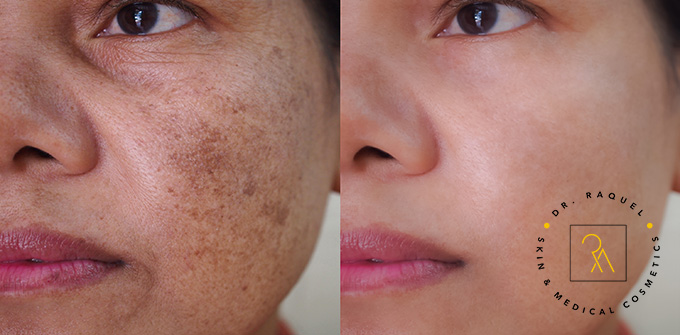Understanding Melasma: Causes, Symptoms, Self-Care, and Treatment Options
What is Melasma?
Melasma is a form of hyperpigmentation, which means there is an excess of melanin, the pigment that gives skin its colour, in certain areas of the skin. While it can affect anyone, it is more common in women. The condition is often associated with hormonal changes and sun exposure, but its exact cause is not entirely understood.
Causes of Melasma
Melasma is believed to be triggered by a combination of factors:
- Hormonal Changes: This is perhaps the most significant factor. Women who are pregnant, taking birth control pills, or undergoing hormone replacement therapy are at higher risk. The condition is sometimes referred to as “the mask of pregnancy” because of its prevalence among pregnant women.
- Sun Exposure: Ultraviolet (UV) light from the sun stimulates melanocytes, the cells that produce pigment in the skin. Even small amounts of sun exposure can worsen melasma.
- Genetics: A family history of melasma increases the likelihood of developing the condition.
- Certain Medications and Cosmetics: Some medications and certain skincare products can trigger melasma.
Symptoms of Melasma
The hallmark symptom of melasma is the appearance of discoloured patches on the skin. These patches are usually:
- Brown or Blue-Gray: The colour can vary, but it typically presents as brown or blue-gray patches.
- Symmetrical: The patches are often symmetrical, meaning they appear on both sides of the face.
- Located on Sun-Exposed Areas: Melasma most commonly affects the face, but it can also appear on other sun-exposed areas such as the neck and forearms.
Self-Care for Melasma
Managing melasma involves a proactive approach to sun protection and skin care. Here are some effective self-care strategies:
- Sun Protection: This is the cornerstone of melasma management. Use a broad-spectrum sunscreen with an SPF 50+ every day, even on cloudy days. Reapply every two hours when outdoors and after swimming or sweating. Additionally, wear a wide-brimmed hat and seek shade whenever possible.
- Avoiding Triggers: Identify and avoid factors that may worsen melasma, such as certain medications and skincare products that can irritate the skin.
- Gentle Skincare Routine: Use gentle, non-irritating skin care products. Too much exfoliation can aggravate melasma.
- Use of Camouflage Makeup: Concealing makeup can help hide melasma while undergoing treatment.

Treating melasma and managing expectations
While melasma can be persistent, various treatment options can help manage and reduce its appearance. Treatment often involves a combination of topical medications, procedures, and, in some cases, oral medications.
It’s important to understand that treating melasma can be a slow process. Results from treatment can take several months, and continuous sun protection is crucial to prevent recurrence. Moreover, not all treatments work for everyone, and what may be effective for one person might not be for another. Regular follow-ups with a skin expert are essential to monitor progress and make necessary adjustments to the treatment plan.
Living with Melasma
Living with melasma can be challenging, but with the right approach and management strategies, its impact can be minimised. Here are some tips for coping with melasma:
- Stay Consistent with Treatment: Adherence to treatment and self-care routines is key to managing melasma effectively.
- Be Patient: Understand that improvement takes time, and avoid switching treatments too quickly.
- Focus on Overall Skin Health: Maintain a healthy skincare routine, stay hydrated, and eat a balanced diet to support your skin’s health.
Melasma, while persistent and sometimes frustrating, can be effectively managed through a combination of diligent self-care and appropriate treatments. Understanding the condition, protecting your skin from the sun, and working closely with a dermatologist are crucial steps in minimising its impact. By taking a proactive and informed approach, individuals with melasma can achieve significant improvements in their skin’s appearance and overall health.
For those seeking professional treatment options, Dr. Raquel’s Clinic offers comprehensive melasma treatments. To explore these options book a personalised skin consultation.
Book Online Or Get In Touch
Elevate your skincare journey with Dr Raquel and Maja.Book your consultation atDr Raquel Skin and Medical Cosmetics today.Contact us at 01732 525875 or drop us an email at[email protected].
